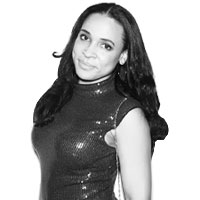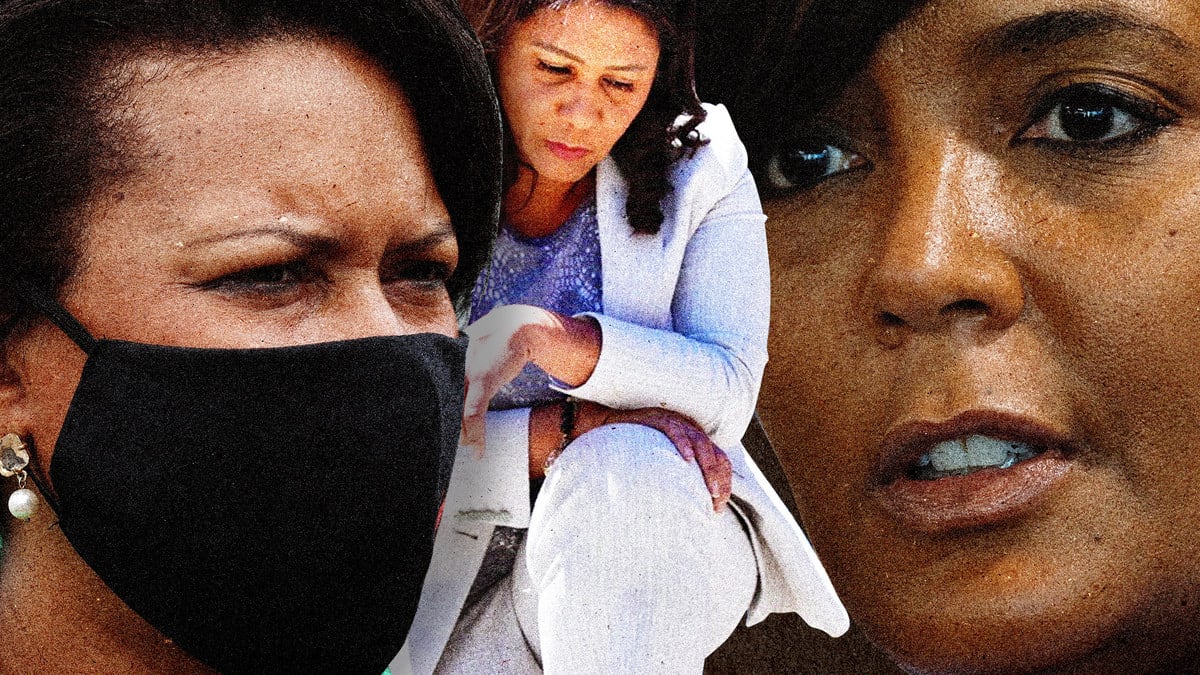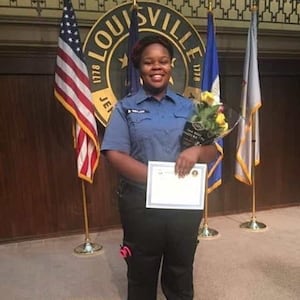It happened in Atlanta. In San Francisco. In D.C. and in Charlotte. Over and over again in recent weeks, black female mayors have stepped onto the national stage—and been forced to publicly face their contradictory roles. Not only are these women in positions of power and obligated to uphold the law, but they also find themselves promoting racial justice in a movement that does not always fight for black women.
“I’m in charge of this city,” San Francisco Mayor London Breed told The Daily Beast, but “I’m still a black woman who is sadly still being treated in a disrespectful way, as if I’m somebody’s slave.”
Mayors leading cities that are at the forefront of protests against police brutality have to take calculated approaches on how to address racism in a system that still downplays black women. The intersectionality of being black and female puts these women in a particularly tight spot when the anti-racism demonstrations make the violence against black women something of an afterthought. Simultaneously, these mayors have to fight for proper recognition because of both their skin color and gender, battling obstacles that their white male counterparts would not have to endure.
ADVERTISEMENT
“I grew up in poverty; I wasn’t even supposed to be here,” Mayor Breed explained to The Daily Beast. “My brother is incarcerated, my sister died of an overdose, I never knew who my father was, I grew up in the projects with my grandmother—I have nothing to lose... That’s why I’ve never been apologetic to call out disproportionate injustices that exist in my city. I’ve lived the experience and I’m tired of white liberal progressives trying to make decisions on how black people should live. How about you listen, how about you respect our experiences?”
Breed, along with a series of mayors, has had to recently handle a slew of social unrest due to publicized violence against black Americans. During the process of grieving for her black community, the mayor also had to deal with protesters attempting to diminish her voice because of her position of power. Worse, they questioned her motives despite the fact that she is doubly marginalized—being both black and a woman. It’s ironic, if not a complete contradiction of what the entire movement is supposed to be about.
“It’s offensive,” Breed said. “All-white protesters come to my house, which they do regularly with fireworks after 11. Shooting them in the air, aiming at my window, calling me out my name: ‘Fuck you and fuck the police. Black lives matter!’”
“What it reminded me of is what the KKK used to do to outspoken black people: drag them out of their homes and hang them from the trees,” Breed continued. “I don’t mind you disagreeing with me and protesting my policies, but let’s not turn black people’s heartache and pain into a joke.”
The death of George Floyd, a 46-year-old black man, at the hands of Minneapolis police led to a wave of demonstrations and Black Lives Matter protests across the U.S. Washington, D.C., saw thousands of activists take to the nation’s capital to demand racial equality while being pelted with rubber bullets and tear gassed outside of the White House. Protesters flooded the Golden Gate Bridge in San Francisco chanting “I can’t breathe,” one of the final statements Floyd made before he died as an officer kneeled on his neck for nearly nine minutes during an arrest. Tensions rose in New York City as cops drove into a crowd of protesters and rioters took to looting Manhattan stores. Minneapolis businesses were set on fire and damaged as people demanded retaliation for the cops involved in Floyd’s death. Some cities seeking some sense of order even called in the National Guard.
But during such national unrest over the unjust death of Floyd, not as much as has been said over the killing of Breonna Taylor—a black woman. The Kentucky EMT worker was asleep when police mistakenly raided her Louisville home, shot, and killed the 26-year-old. The vocal outcry that led to the arrest of Floyd’s assailants has not been met for the case of Taylor. And the officers responsible for her death still have not been arrested.
“There have been so many cases like this of black women who died by the system and their identities have been erased,” says Kali Nicole Gross, a Martin Luther King Jr. professor of history at Rutgers University. “The pattern of erasure and neglect facilitates more violence against black women and leaves them to be much more vulnerable. We can’t really make a change if we don’t acknowledge the injustice. The plight of the black man takes focus. There’s no question that they face unending inequality and state violence. No one is questioning that. But the purpose of the culture is to support the entire community.”
Gross explains that, historically, black women have not benefited from the judicial system. Instead, it has devalued them and looked past their humanity. For centuries, black women and girls were treated as if they were outside of the law’s protection, as if they had no virtue. Even today, black women have been assaulted during the wave of protests across the United States, but there has been no public concern drawn towards these incidents.
“The way black women and girls have been socialized, there’s this public shame that if they take up social activist efforts for themselves that it’s seen as a distraction of a more pressing issue,” Gross said. “No black woman wants to be seen as not supporting black men and the community, but our best grassroot organizers are hesitant to march on our behalf. We are, in part, socialized to take care of our community before ourselves.”
That sentiment rings true for the mayors handling the uproar of racial injustice. Mayor Breed said that Floyd’s last plea for his life was a universal call to black women, particularly mothers.
“We are nurturing as black women,” she added. “We don’t want to see death to anybody. We love our communities. We want the very best for them. We want people to be OK.”
During a press conference following protests in Atlanta after the death of Floyd, Mayor Keisha Lance Bottoms addressed a crowd to say that before anything else, she is a mother. “I am a mother to four black children in America,” she said. “One of whom is 18 years old. And when I saw the murder of George Floyd, I hurt like a mother would hurt... When I heard there were rumors about violent protests in Atlanta, I did what a mother would do: I called my son and said, ‘Where are you? I cannot protect you, and black boys should not be out today.’... I wear this each and every day. And I pray over my children each and every day.”
Both Breed and Bottoms have taken action amid the unrest over Floyd's killing to correct the flaws of the system, risking the wrath of critics for doing so. On Saturday, Bottoms responded swiftly after protesters expressed outrage over another suspicious police shooting of a black man. After 27-year-old Rayshard Brooks was fatally shot by police while running away from officers attempting to arrest him on a DUI charge, Bottoms announced the resignation of police chief Erika Shields and the termination of the police officer who fired the shots.
Breed, too, took steps toward “real change” with a police reform plan unveiled earlier this week. She has proposed a “fundamental change” in policing that would see officers stop responding to non-criminal calls, and she has also moved to demilitarize the police department by banning military-grade weapons.
Charlotte’s mayor, Vi Lyles, addressed “the horror and difficulty” of watching Floyd die at the hands of people who were supposed to serve and protect. But the issue becomes even more heartbreaking when having to explain to others on how to reckon with that reality.
“It brought up a lot of pain,” Breed said, as she recalled experiencing her own loved ones dying at the hands of police. “We accepted it, but we were not happy about it.”
Adding on the need to nurture, Gross recognized that she cannot imagine how the mothers of black women and girls must feel knowing that no action has been taken in regards to the death of their daughters.
“My heart breaks for Breonna Taylor’s mother, but I’m also awed by her strength. She’s launched a campaign to get justice for her child even while she’s grieving. Even in the case of Darnella Frazier, the 17-year-old black girl who recorded the footage of Floyd. If it wasn’t for her capturing that moment, we wouldn’t have this movement,” Gross said. “Think of what she is dealing with.”
The professor says it’s not a coincidence that of the three most prominent current race-related cases—the deaths of Ahmaud Arbery in Georgia as well as George Floyd and Breonna Taylor— that the death of Taylor is the one to not receive any form of “justice.”
“They have yet to make an arrest. We have not even gone through the first form of performance. I do think that is because she was a black woman. If she was a black man who died under the same circumstances, it would have happened by now. The community outcry would have prompted that.”
In the case of Ahmaud Arbery, it took over two months for the men responsible in his February death to be reprimanded. However, after footage of the murder appeared online in May and public outcry demanded justice, the men involved in his killing were arrested and charged.
When remembering black people who died due to racial violence, Gross said that “people are very quick to even go back as far as Emmett Till, but they forget about Addie Mae Collins, Cynthia Wesley, Carole Robertson and Carol Denise McNair, who died in the Birmingham church bombing. Sexism is embedded in the system of discrimination.”
But despite the media and society’s seemingly negligent coverage of violence against black women, black women in leadership still take the responsibility to stand up for a community, a culture, and the black men who do find themselves in the hands of police brutality.
“I just do the best I can, as a black woman,” said Mayor Breed.
Even if black women are not always supported and uplifted in the midst of a discriminatory system, they can always be there to support and empower one another. Through all of the social unrest, the leader of San Francisco explains that there is a sisterhood among the black female mayors.
“We reach out to each other. I love them. We feel the pain of our people,” the mayor said. “We understand the roles we are all in. The pressure we’re all under. It’s just something only a black woman would understand.”







